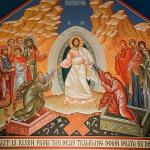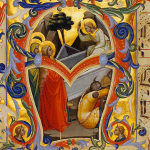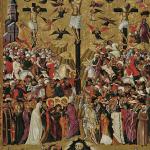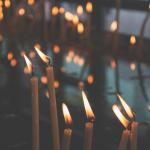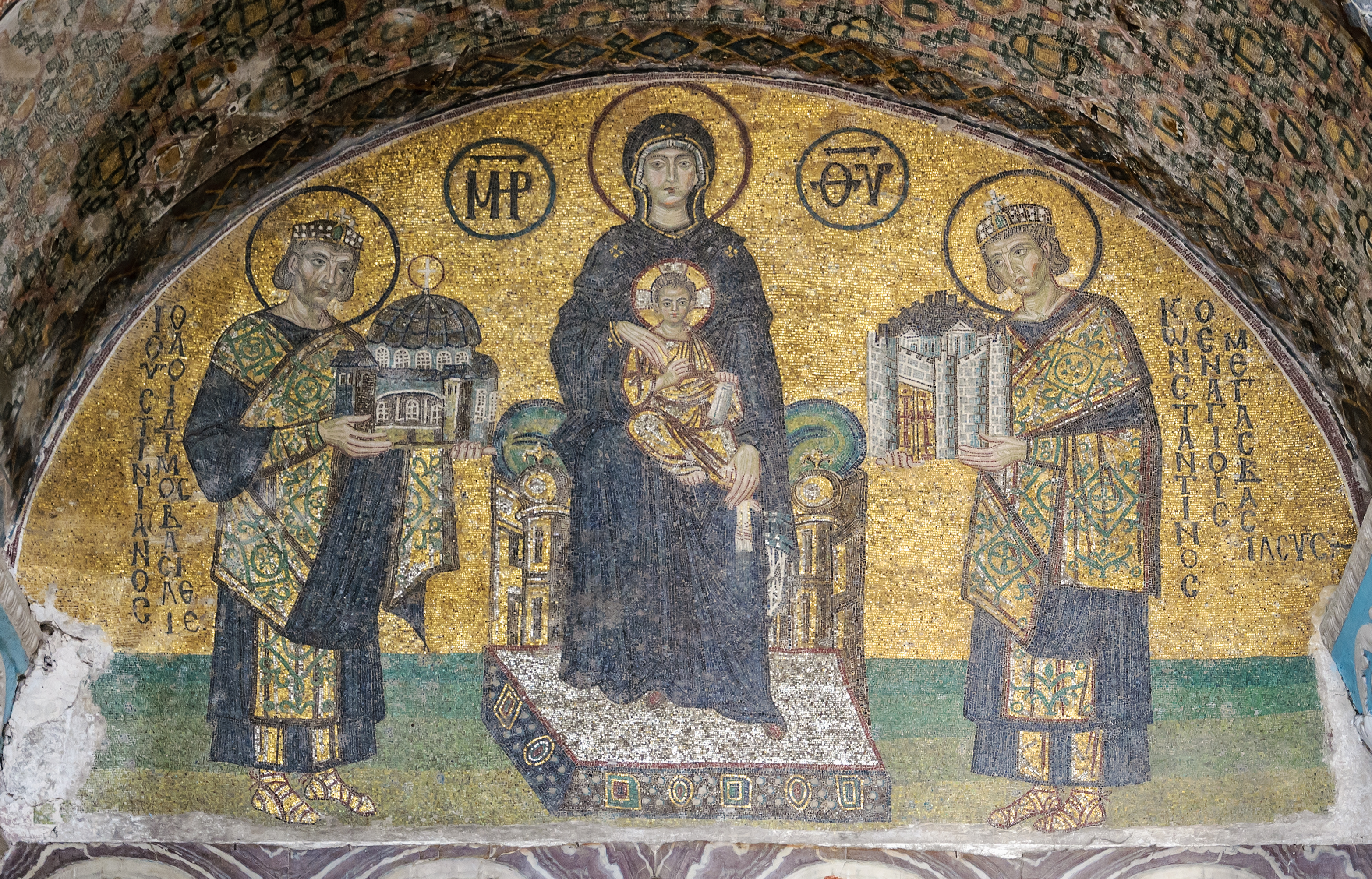
There is a story about Constantinople that makes the inner evangelical in me wince. It’s about Helena, the mother of the Emperor Constantine, who had defeated his opponents at the Battle of Milvian Bridge by painting on his soldiers’ backs the sign of the cross; in hoc signo vinces, he had heard in a vision – in this sign conquer. Helena, in her turn, took a pilgrimage to the Holy Land and brought back (among other things) a part of the True Cross, the wood on which our Lord Jesus Christ was crucified, and deposited in the city named for her son, the eastern capital of the empire, once called Byzantium, now called Constantinople; the reasoning came to be that the city that contains the True Cross would never be taken. Centuries later, it was the True Cross that was credited with the Greeks’ routing of their enemies, around the same time that the Rus’ defeated theirs, and in celebration, the True Cross was brought out of the imperial storehouses to be venerated in the Church of Holy Wisdom, the Hagia Sophia, for the duration of the Dormition Fast from August 1-15.
Everything about this story, including the veneration of Helena and Constantine now in my own church’s tradition as Holy Equal-to-the-Apostles (a title in our church also for Ss Olha and Volodymyr), feels wrong, at least to whatever is left of my residual Protestantism. I was raised evangelical, and as difficult as it might be to believe in the Age of Trump, evangelical Protestants have some strong feelings about the mixing of church and state, not to mention about the veneration of relics and the attribution of victory to them. That the first day of the Dormition Fast coincides with the commemoration of the Holy Maccabean Martyrs is of no comfort at all: the records of the Maccabees are not in the Protestant Bible, and when I was a kid and a Catholic friend told me about another one of these kinds of books (Tobit), I prayed for his soul because he was adding things to the word of God, and God would ‘add to him the plagues described in this book,’ according to Revelation(s) 22:18. So too, the Lesser Blessing of Water and the Blessing of the Honey sometimes still feels idolatrous when I am in a bad mood, made only funny when my spiritual father at the Eastern Catholic temple in Richmond announced the honey blessing, and a Chinese Catholic woman enthusiastically grabbed her fiancé and shouted, Bless my honey!
And then there is the context for all of this in the first place: the falling-asleep of Mary, the Mother of God. Marian veneration, of course, is uncomfortable enough for evangelicals. But here there are plenty of imperial references too – the Dormition Fast coincides with empire in its fullness in this story of Constantinople, and those in the Latin Church who say that I joined the church whose liturgy is the most inculturated by an imperial court should be encouraged to resist their laughter: the promulgation of the Assumption by the Bishop of Rome ex cathedra is as imperialistic as they come.
But history is even less comfortable than subjectivity. Rome fell. So did Constantinople. So did Kyiv. Moscow too, as a matter of fact. And Jerusalem itself: what number of tragedies this city has had to endure. The city may contain the true cross; its cathedral can be named for Holy Wisdom itself. But though Christ is among us, it does not seem to bear out that its enemies will not conquer. From conquering in this sign, the city that houses this sign may be conquered. Herein, I think, lies the deeper truth behind my residual evangelical discomfort with the material triumphalism of relics and blessed objects and even icons: by none of these things have holy cities ultimately been saved.
And yet, perhaps even without the triumphalistic apostolic churches knowing it when they entered into cahoots with empire, this might be the primordial truth of the Dormition, the name of many a cathedral in holy cities where even relics of Equals-to-the-Apostles are deposited. The Mother of God – so called because she was declared at the Third Ecumenical Council to be the Theotokos, the God-bearer, the one who bore Jesus Christ who is God incarnate in her womb – falls asleep; her earthly body encounters death. The apocryphal tale is that the Holy Apostle Thomas goes back to the tomb to discover that the body is missing and flowers are in its place – such are the seeds for the Latin dogma of the Assumption, the taking-up of even the body of the Theotokos into heaven – but whether or not one has assumptions about the Dormition, it is an uncomfortable teaching on which to meditate: the material may even contain the divine, but that is no guarantee against death, for the divine exceeds the material. In such a way, only in death is there new life; only by dying is there resurrection and the hope of a new world. Perhaps this is what is truly meant by bearing the true cross in the midst of the city.
The Dormition of the Most Holy Theotokos presents to the church the truest truth of what it means to bear God in our midst. Perhaps – though I am only discovering this through experience, not liturgical study – it is because of this that the apostolic churches fast in preparation to receive this deep truth. Even the Latin Church has such a history of the Dormition Fast, as the Holy Pope Leo the Great reveals when he discusses the four fasts of the year:
The Church fasts are situated in the year in such way that a special abstinence is prescribed for each time. Thus, for spring there is the spring fast–the Forty Days [Great Lent]; for the summer there is the summer fast…[the Apostle’s fast]; for autumn there is the autumn fast, in the seventh month [Dormition fast]; for winter there is the winter fast [Nativity fast].
What I want to do during this Dormition Fast, then, is to write through my slow discovery as a Christian of who the Most Holy Theotokos, Mary God-bearer, is, seeking this primal truth. I have some ideas for how I will proceed, but perhaps I will learn more about what it means for Christians of the evangelical communities and apostolic churches to say that Christ is among us as I write through the way of death, in the hope of new life through resurrection, cognizant of the history of how triumphalism has died many deaths in many a city that thought it bore the things of God in their midst. This is important for me, a convert to the apostolic churches, to remember; many a person like me has rejected the evangelicalism of our past to claim that the material is a channel of a supernatural order, that which mediates the grace of God. But perhaps evangelical cautiousness – much as it denied us participation in the material surnaturel – reveals even deeper truths about materiality that are messy and uncomfortable. It is there that I want to enter, that in such primal depths, I might be truly Catholic in the primordiality of communion, truly Orthodox in being led by the Spirit into all truth.
This is the first of my posts on the Dormition Fast.










